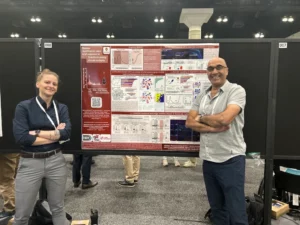 Get to know our researchers! CURE Conversations features interviews with our scientists and discusses the focus of their work as well as recent breakthroughs in the field of epilepsy research. These investigators are the people behind the scenes who work diligently in the labs to unravel the mysteries of epilepsy, studying the science that will one day lead to cures for the epilepsies.
Get to know our researchers! CURE Conversations features interviews with our scientists and discusses the focus of their work as well as recent breakthroughs in the field of epilepsy research. These investigators are the people behind the scenes who work diligently in the labs to unravel the mysteries of epilepsy, studying the science that will one day lead to cures for the epilepsies.
Can you share some details about what you do?
I run a lab in the Department of Neuroscience at the University of Wisconsin at Madison. We study the role of genes in epilepsy and breast cancer. We focus on one master regulator of genes called REST. My lab uses computational approaches to study how large patterns of gene expression in disease can be used to predict how patients will fare. We use insights from these studies to guide experiments in mouse models of cancer and epilepsy and to test novel treatments.
What motivated you to become interested in this area of research?
I have been interested in how genes are controlled since I was a graduate student. It became clear that a key controller of many genes, REST, plays a major role in epilepsy. Later we found that it also played a role in cancer. So the lab split into two subgroups to chase both these findings. The subgroups synergize very well together, such that findings in the brain color how we look at cancer, and vice versa.
What is your current research focus?
Genes are stretches of DNA that encode information required by cells to perform certain tasks. A major focus of our lab is the study of how genes in the brain are controlled by neuronal activity. How do seizures alter the patterns of genes in neurons and how do these changes alter the brain functions after a seizure? Are there long-term alterations in gene patterns after a seizure that make the brain prone to further seizures in the future? Can this long-term alteration (a process called “epigenetics”) be controlled to prevent the development of epilepsy?
Can you share some of the latest findings?
Some epilepsies are caused by environmental factors such as a head trauma. These are acquired or evoked epilepsies. Other forms of epilepsy are caused by gene mutations and are termed genetic epilepsies. We have found that we can control seizures in both genetic and acquired epilepsies with drugs that control epigenetic processes. Whereas some work has already been published showing a role for epigenetics in acquired epilepsies, our findings with genetic epilepsies were totally unexpected, novel, and exciting.
What is the ultimate goal for the research and how will it impact patients with epilepsy?
Ultimately, it is hoped that tools will be invented that can repair or fix mutated genes and cure epilepsy. However, that goal is still far in the future. Our goal is to find ways to leave the mutations alone but use epigenetics to cover up and hide the effects of the mutation. We predict that this goal can be achieved with currently available drugs and in a much shorter time frame that genetic engineering.
What accomplishment—personal or professional—are you most proud of?
I get to hang out and speak with some of the brightest people on the planet on a daily basis. I have friends across the globe who lead their fields in the sciences and humanities. As a scientist, I have achieved the position of being paid to work on my very favorite hobby! I get to witness the uncovering and discovery of new knowledge, totally unseen to any other human in the history of mankind, everyday. As a teacher, I have altered the course of young peoples’ trajectories into science. My lab has generated findings that could change clinical practice in the fields of epilepsy and breast cancer.







